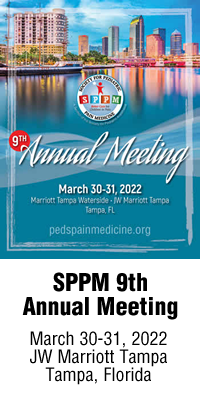Annual Meeting Reviews
The Battle for Wisconsin: To PCA or NOT to PCA
By Deepa Kattail, MD, MHS, FAAP
Department of Anesthesiology
McMaster University, McMaster Children’s Hospital
Hamilton, Ontario, Canada
The Virtual 8th Annual Meeting of the Society for Pediatric Pain Medicine continued with our long standing (and popular) tradition of a Pro/Con debate. This year, we invited our speakers to debate over patient-controlled analgesia (PCA) in a battle entitled, 'The Battle for Wisconsin: To PCA or NOT to PCA'. Our esteemed speakers, both from Wisconsin, Dr. Steven Weisman and Dr. Timothy Casias presented excellent sides to this nail-biting debate. Given that this was the first virtual Pro/Con debate hosted by our Society, the format was new and presented each speaker with four questions.
We first heard from Dr. Weisman, professor at Medical College of Wisconsin and Children’s Wisconsin, who supported the Pro side and tackled the first question, “who should manage PCA’s?”. Dr. Weisman took the more traditional stance and felt that PCAs in the pediatric population should be managed by the acute pain service to have a specialized, experienced service, rather than having PCAs managed by all, and thus diluting management experience.
Dr. Casias, assistant professor at University of Wisconsin and American Family Children’s Hospital, hit back on this point though. He felt that PCAs are better managed by all services in a hospital, rather than an acute pain service, especially in smaller hospitals where primary services can offer more rapid services and maintain their skills in pain management.
The high cost of an acute pain service was also noted to be a reason for primary services to lead pain management.
The next questions presented to our debaters were, where can PCA be avoided and do PCAs increase length of stay? Dr. Casias reviewed ERAS protocols for major surgeries such as spinal fusion, pectus excavatum, which can be managed with stronger opioids, such as methadone, or regional anesthesia techniques, thus avoiding PCA altogether.
Dr. Weisman responded with a great example where PCA has been shown to be superior to other options, that is the management of pain after pectus excavatum repair, where PCA combined with a multimodal regimen has been shown to have lower length of stay compared to thoracic epidurals. Issues around safety and PCAs were also addressed by both debaters. Dr. Weisman presented strong data on the safety of not only PCA but also PCA by proxy. Dr. Casias, agreed PCAs are safe, but given overall decrease in PCA use, less experience in ordering PCA may impact familiarity and thus present safety issues.
The final question was the impact of PCA on overall opioid use. Dr. Weisman presented data that showed decreased opioid use when PCA is combined with multimodal regimens and rapid transition from PCA to oral analgesia. Both debaters agreed that opioids remain an integral part of acute pain management, and personally I was happy to hear that “opioid free anesthesia” was not a concept that was openly embraced by both our experts.
Overall, this year’s debate was thought-provoking with both our speakers presenting fantastic points with strong evidence. Acute pain management continues to progress with novel approaches including new medications and interventional techniques such as nerve blocks (with new ones being invented constantly!), with ongoing support for more traditional modalities such a PCA, that was revolutionary when first utilized and continues to have a role in pediatric centers. Despite, their opposing views, both Drs. Casias and Weisman agreed that all children deserve analgesia, whatever the modality, to provide fantastic pain management.




